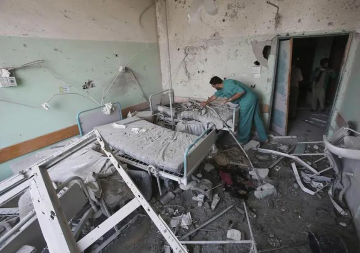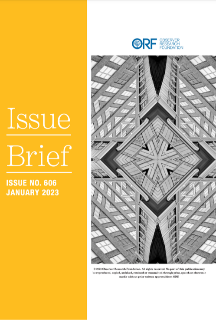Sri Lankan authorities considered 'hilarious' the ceasefire demand put forward by the LTTE, especially when it has only the few fighters left in an area which is less then 60 sq km. This week, LTTE requested the international community to bring

Sri Lanka
< class="maroontitle">LTTE seeking truce
Sri Lankan authorities considered ‘hilarious’ the ceasefire demand put forward by the LTTE, especially when it has only the few fighters left in an area which is less then 60 sq km. This week, LTTE requested the international community to bring about a truce between them and the government of Sri Lanka which is not ready to negotiate till the LTTE surrender and lay down its arms. With LTTE’s last bastion about to fall anytime, Prabhakaran and other senior LTTE leaders has been engaged in fighting the last of their battles. During one such raid, the Sri Lankan army found signs of a lavish lifestyle led by LTTE’s senior leaders.
Moral support to Sri Lanka came from none other then India which was warned of prospective LTTE air raids by Sri Lanka’s Army Chief Sarath Fonseka during an interview to an Indian daily though it later backtracked on its earlier stand when Indian Foreign Minister asked Rajapaksa government to enter into negotiations with the LTTE to facilitate civilians escape from the war zone.
Nepal
< class="maroontitle">Nepal-China to sign peace pact
Last week, the Assistant Chinese Foreign Minister, Liu Jieyi, leading a 14-member delegation, visited Kathmandu as a special envoy of the Chinese government. The delegation met Prime Minister Prachanda, Defence Minister Ram Bahadur Thapa, Foreign Minister Upendra Yadav and other senior officials and reiterated China’s support to Nepal’s development endeavour . The Chinese visit comes ahead of the possible pro-Tibet protests in March. The visit is also aimed to step into the vacuum created by India’s failure to deal with the Maoist-led government in Nepal. China has proposed a new “Peace and Friendship Treaty” with Nepal in the changed political context and submitted a draft treaty to the Prachanda government. According to the new treaty, China would respect Nepal’s sovereignty and territorial integrity. Nepal would have to recognise the “One China” policy and declare Tibet as an indisputable territory of China. It should not allow “anti-China activities” from its soil. The first friendship treaty between the two countries was signed in 1960. Presumably, the treaty will be signed during PM Prachanda’s forthcoming visit to Beijing in April.
Bangladesh
< class="maroontitle">Bangladesh Rifles Mutiny
The week saw a bloody mutiny by the country’s border guards Bangladesh Rifles (BDR).The celebrations of the BDR Week turned violent on February 25 as hundreds of senior officials of Bangladesh army were killed by the BDR soldiers. BDR men justified the killing of their senior officers by citing frustrations over delays in settling pay disputes. Naming the mutiny as Operation ‘Dal-Bhat’, they accused the military officers of enjoying perks at their cost. People, however, remained deeply suspicious and believed the attack to be part of a political conspiracy against the Sheikh Hasina government. The government first offered general amnesty to bring the situation under control but has decided to charge 1000 BDR personnel with murder and conspiracy.
Maldives
< class="maroontitle">Human Rights initiatives
Amnesty International appreciated Maldives human rights record as the best in whole of South Asia and commended its smooth transition of powers. Maldivian Vice President Mohamed Waheed made it clear that his government doesn’t believe in the policy of incarcerating the political opponents. AI also hailed the prevalence of free media in the Islamic country. This week, in order to provide support and assistance to “democratic governance” in the atoll nation, United Nations Development Programme (UNDP) has given over US $400,000. The objective of the entire exercise is to promote human rights, reduce corruption and advance public administration reforms through the projects which are to be undertaken by newly-formed independent commissions in the Maldives.
Pakistan
< class="maroontitle">Sharif brothers disqualified
The Supreme Court on Wednesday (February 25) disqualified former Prime Minister and leader of PML-N Nawaz Sharif for previous criminal convictions and dismissed the government of his brother Shahbaz Sharif in Punjab. The Governor’s rule has been imposed on the province, causing great uncertainty in the country. The Supreme Court upheld the previous decision of the Lahore High Court and disqualified Nawaz Sharif in the light of his conviction in the ‘Musharraf Plane Hijacking Case’ and the ‘Helicopter case’. Shahbaz Sharif was dismissed for the mismanagement of public money. The dismissal is widely seen a move by President Asif Ali Zardari to consolidate power by sidelining his closest rival and thus securing a foothold in Punjab, the most decisive province in Pakistani politics. The verdict has been criticized by the media, politicians and prominent members of civil society, who view the judiciary as biased in favour of the current dispensation.
< class="maroontitle">Contributors:
- Anjali Sharma – Sri Lanka, Maldives
- Joyeeta Bhattacharjee – Bangladesh
- Paul Soren – Nepal, Bhutan
- Kaustav Chakrabarti – Pakistan
The views expressed above belong to the author(s). ORF research and analyses now available on Telegram! Click here to access our curated content — blogs, longforms and interviews.




 PREV
PREV

